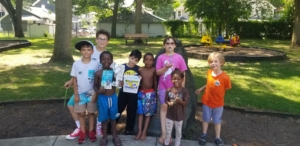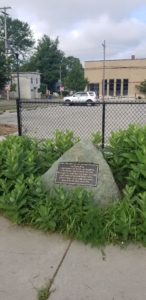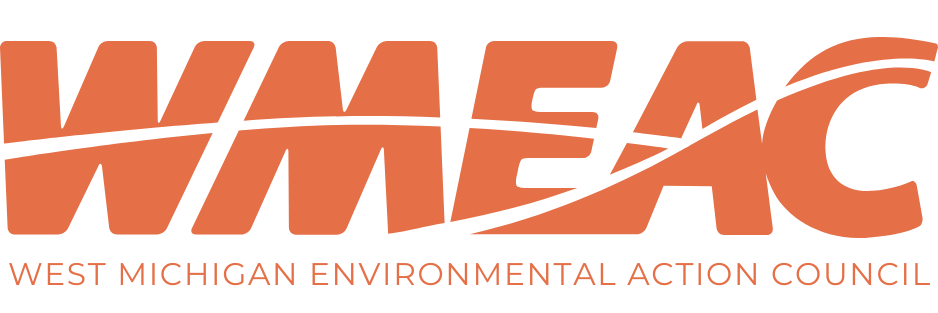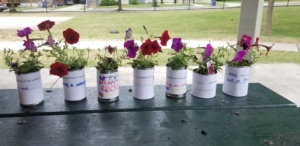By Dan Christmann
“No, that’s cottonwood, not cotton candy,” Emma, one of WMEAC’s education interns, says leaning over a student checking his tree identification worksheet against an answer key. “Don’t eat it.”
“I want cotton candy,” another boy pipes in. “Are we having cotton candy for snack?”
“We have some healthy fruit for snack,” says Kyle Hart, WMEAC’s Environmental Education Coordinator. Then, with a mischievous gleam in his eye, he adds, “and some meatloaf…”
The four boys at the table erupt in laughter. It takes a couple of minutes to calm everyone down, and talk of cotton candy peppers the conversation from now until the end of the day.
Ridiculous humor seems to be part of the programming at WMEAC’s summer camp at Joe Taylor Park. Kids and adults alike goof off, play on the play structure, and make silly jokes about tree names.
But for the education team, this play is deadly serious. They have been working on this summer camp, centered on the Baxter neighborhood of Grand Rapids, for several years now. And while WMEAC has participated in summer programming before, we always hosted them with other organizations. Aside from a pilot program last year, this year is the first time WMEAC has hosted its own camp for kids.
Programming for the first day included the aforementioned tree identification scavenger hunt, a demonstration from the storm water model, and a discussion of how chicken nuggets might be a form of pollution. The storm water model is a particularly nifty contraption that shows how different factors can effect a watershed, especially different models of land use. I’m not really sure how the chicken nuggets entered the picture.
We also played with microscopes and planted violets with promises for future sustainable behavior written on the side.The next day, I’m told, involved building solar powered cars out of K’nex sets. I’ve never been more disappointed that I had to miss hanging out with a bunch of elementary schoolers before.
On one hand, we obviously put on these camps to promote environmental education. Watching a storm sweep through a simulated city when you take away the wetlands is going to stick in a kid’s mind, even if they’re more preoccupied with the destruction. We’re giving them tools, things to use in the future when its actually relevant to them.
“We want to empower students and their community,” Kyle told me when I sat down with him later at the WMEAC office, “their parents or their neighbors or their peers, to be able to understand the value of natural resources around us but then also take charge to take care of them.”
But Kyle also believes that the camps play an important role in highlighting accessible, urban resources.
“Nature is not just a national park an hour away. There’s nature here. You can learn about and take care of the environment here. In an urban area.”
For Kyle, urban parks like Joe Taylor Park are more than just their play structures or their splash pads. They are gathering places, centers of growth where people learn to relate to nature, even if the area doesn’t seem very ‘natural.’
“They’re a refuge from very busy streets, and you know, the concrete jungle. Which is really important for students who grow up in these urban areas who might not have the means to experience traditional wilderness. Wilderness is kind of a luxury.”
This is one of the many reasons why we’re doing these camps by ourselves, and why we hold them in community parks. Why we’re attempting to engage specific communities, one at a time.
“We’re trying to figure out those barriers of entry to engagement and then meet the community however far we need to meet them. If it’s 90/10, you know, we can do that. That’s our whole mission; it’s to serve these under served or underrepresented communities.”
Planning a free summer camp has presented challenges for WMEAC, both logistically and in terms of engaging the community to participate. But from what I’ve seen, the work seems to be going fairly well so far.
“That was like magic!” I overheard one of the kids say as I packed up my things to head back to the office.
Emma laughed and shook her head. “You’re right, my dude! Science is magic.”
We’ll be holding the second of our Summer Camp sessions on the sixth and seventh of August. For more information visit our webpage, and keep an eye out for expanded sessions in your neighborhood!



